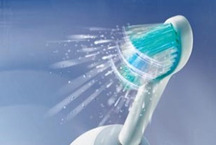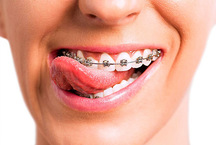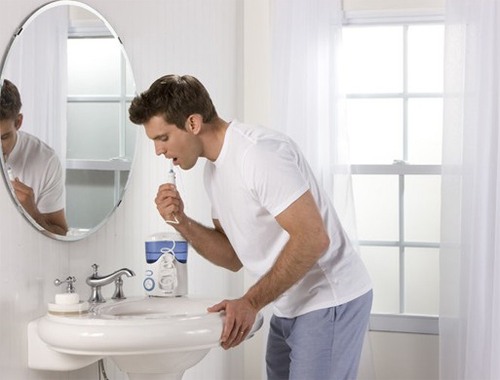
What is a irrigator for the oral cavity, and what are the parameters for choosing this device? Before you start choosing a device, you need to consult with a dentist, decide whether you need it and how many people in the family will use it - it depends on the type of irrigator that you need to buy. We will try to make out: who needs an irrigator for the oral cavity, what types of device exist and what functions and parameters should be used when choosing it.
What is an irrigator and what is it for?
Irrigator is called a device that with the help of a directed stream of water cleans the spaces between the teeth, while massaging the gum. It is much more effective than a toothbrush or floss to cope with a soft plaque in hard to reach places. The advantages of this device are:
- high level of oral hygiene;
- prevention of the development of diseases of the teeth and gums;
- removal of pathogens from the surface of the teeth, prostheses, orthodontic systems, as well as from the mucous membrane, gums and tongue;
- accelerating the regeneration of the gums, metabolism and functioning of the salivary glands;
- improved microcirculation.
Who recommended the use of irrigator?
Dentists recommend the use of irrigator:
- Women during pregnancy - pregnant women have an increased risk of developing carious lesions and periodontal diseases, the irrigator thoroughly removes plaque, food debris and easily massages the gums. After some time of using the irrigator, future moms note a significant improvement in the condition of the oral tissues.
- Patients with bite problems or crowded teeth that undergo orthodontic treatment with braces and face the problem of quality tooth cleaning - a directed jet of a special solution or water from the irrigator removes plaque and food debris from all hard-to-reach places.
- People with periodontal disease - Dentists recommend using the device for gingivitis and the initial stages of periodontitis, while for greater effect, instead of water, use the solutions prescribed by the doctor.
- Patients with orthopedic structures in the mouth (removable and fixed prosthetics, implants).
- Smokers and people who have bad breath.
- Patients with a diagnosis of chronic rhinitis or sinusitist are often appointed by washing the nasal cavity, for which you can use a special nozzle.
Contraindications to the use of the device
It is not recommended to use an irrigator in the following cases:
- chronic diseases of the oral mucosa in the acute stage;
- bleeding gums, not passing after two weeks of using the device;
- children can use the irrigator only under the supervision of adults;
- severe diseases of the heart and cardiovascular system.
In any case, before using the device, you should consult with your dentist.
Types of irrigators
In order to decide which irrigator to buy - you need to answer the following questions:
- Who will use the device - one person or all family members?
- Do your family members have orthopedic or orthodontic structures, bite problems, or oral diseases?
- Will children and elderly people use the device?
- How often and for how long do you leave home and do you need an oral care device on a trip?
- Does noise and power consumption matter to you?
Exist three types of irrigators: with a hydraulic pump that is powered by electricity - stationary and portable; connecting to the water supply.
Stationary irrigator
For a family is best to choose stationary irrigator with a set of tips for all households.
These models operate on the network, a pulsating sufficiently powerful jet of fluid from the reservoir is supplied under pressure. It washes away soft plaque and food debris from interdental spaces from orthopedic and orthodontic structures.
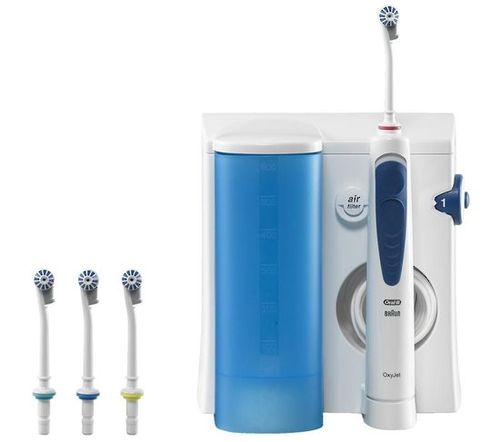
Photo: www.toothshop.co.nz
Advantages of stationary irrigators:
- large tank volume
- variety of modes, a large set of nozzles,
- big set of nozzles,
- a strong enough motor that allows you to create a good pressure jet of fluid.
Disadvantages:
- stationary irrigator takes up a lot of space
- during operation, it can vibrate and make quite a lot of noise,
- there is a danger of electric shock (do not touch the working device with wet hands or use it when taking a bath and shower, it is unacceptable to immerse the irrigator in water),
- requires regular washing and drying of nozzles, a special place for storing nozzles to prevent the accumulation of microorganisms on their surface.
The minimum cost of a stationary irrigator is about 3,000 rubles.
Portable irrigator
If you often leave the house for a long time (on business trips, on a visit, travel) or intend to use the device in the country or at work, then you should pay attention to the model portable irrigators. They consist of a tank, a battery and a pump. The battery lasts about seven days.
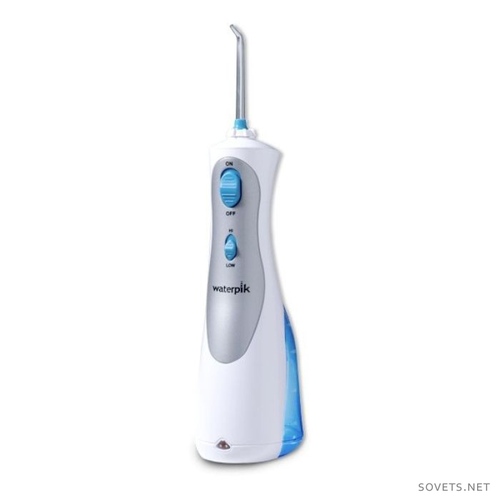
Photo: sovets.net
The advantages of portable irrigators:
- small size and small weight of the device,
- mobility.
Disadvantages:
- can't turn over and tilt,
- small power, not allowing to create a good pressure jet,
- small tank volume
- few nozzles and modes.
The minimum price of the device is from 2000 rubles.
Water supply irrigators
The device is connected directly to the faucet, the kit usually includes tips on various faucets. Removing it after use is not necessary, since the device has an adapter that allows you to switch water.
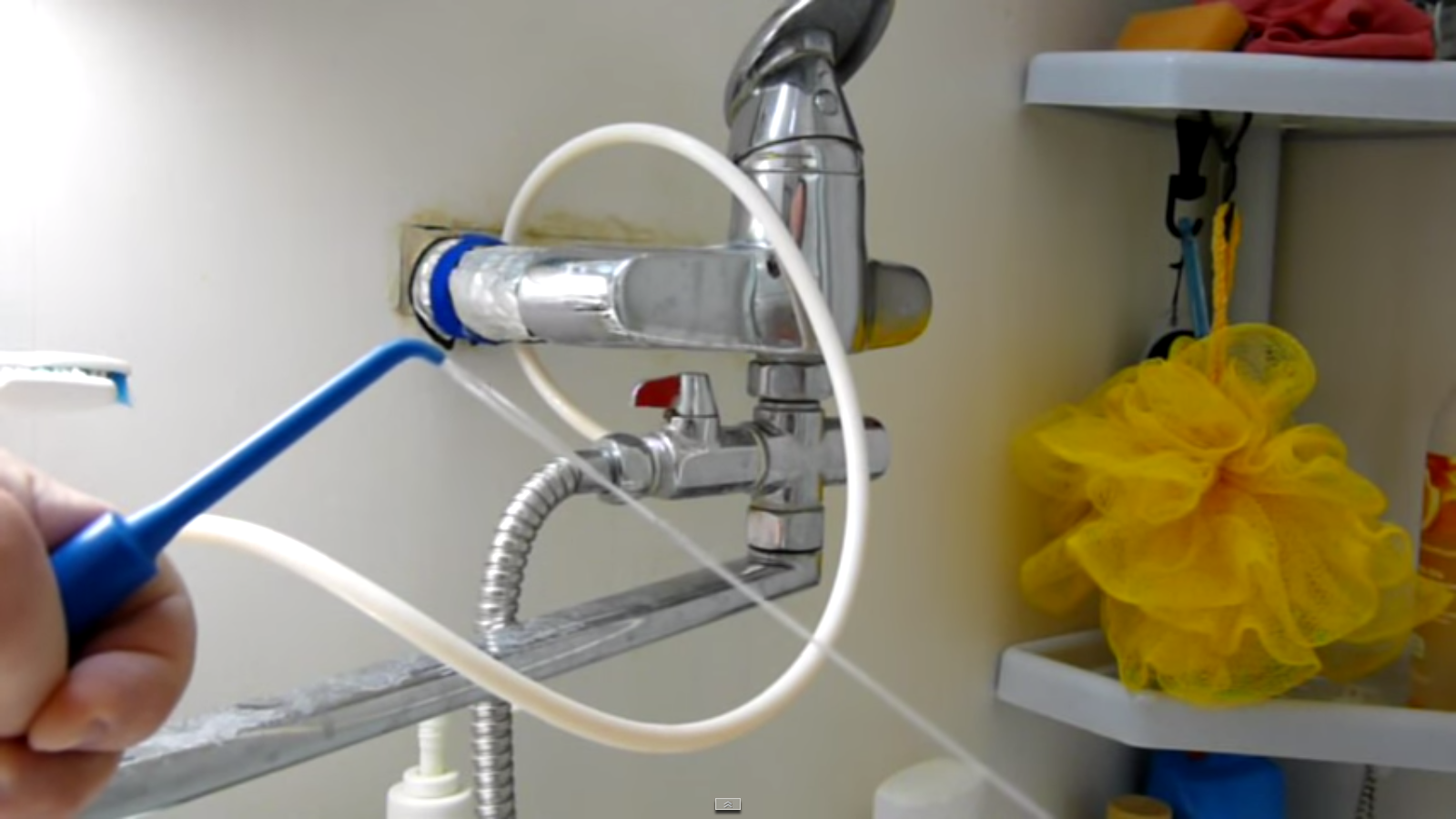
Benefits:
- low cost,
- continuous water supply
- small size and mobility.
Disadvantages:
- Low quality tap water.
The minimum cost is from 1200 rubles.
Additional irrigation selection criteria
Features of the jet of fluid
One of the most important selection criteria is the technology with which the teeth are cleaned or the feature of a jet of liquid. By this criterion can be identified:
- Cleaning with the help of mono jet - at the moment the technology is practically not used. As cleaning at the same time happens a thin continuous stream of liquid.
- Irrigators that create a pulsating stream - thanks to small, almost imperceptible pulsations, more efficient cleaning and micro-massage of the gums occurs.
- Cleaning with a stream of fluid with microbubbles of air is most effective, since in addition to cleaning the teeth, the gums are massaged and periodontal pockets are cleaned.
Number and types of nozzles for irrigator
Some irrigator models have one standard nozzle; this is not the best choice for good oral hygiene. It is better to choose a model that contains a basic set of nozzles, before buying, you should consult with a specialist who will help you determine the number of nozzles you need. Additionally, the kit may include the following nozzles:
- to clean the tongue,
- for periodontal pockets,
- for cleansing orthodontic appliances,
- for cleansing fixed dentures,
- for implant care,
- brush head,
- for polishing tooth enamel and removing plaque from coffee and cigarettes,
- for washing the nose and nasopharynx.
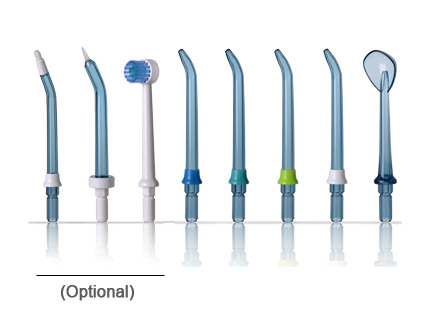
Photo: www.risun-tech.com.cn
If it is planned that the device will be used by several people, it is better to purchase a nozzle of a different color for each family member - this will make it possible not to confuse them with use.To obtain the best result, you can use hygienic liquids for irrigation of the oral cavity. Medical rinses and balms will be recommended to you by a doctor based on the state of your oral cavity - this may be a liquid containing fluoride or calcium, agents with anti-inflammatory, antibacterial or hemostatic effect.
The ability to control the pressure of the jet of fluid
Practically all models of irrigators have the ability to regulate the pressure. When purchasing, it is necessary to ensure that your device has such a function. It is indispensable if the device is used by children, the elderly, patients with periodontal disease. Yes, and absolutely healthy people. it is better to start using the irrigator with the least powergradually increasing it.
The possibility of repair in case of breakage and availability of service centers
When choosing a irrigator for the oral cavity, pay attention to whether it is possible to repair it in case of breakage. Power surges, hard water, and too frequent use can damage the machine, and many models cannot be repaired at all, they can only be replaced.
Before the final choice of the manufacturer, pay attention to the availability of service centers in your city where you can carry out warranty and post-warranty repairs.
How to use the irrigator for the device to serve for a long time?
There are a few basic rules for using the device:
- In order to avoid overheating, it is impossible to turn on the device when the tank is empty.
- If herbal decoctions are used for cleansing - they must be carefully filtered and washed the device after use.
- Do not use an oil-based fluid for irrigating the mouth.
The best manufacturers of various models of irrigators
In the world, only a few companies are recognized leaders in the production of irrigators. These include:
- Braun - German company, which produces mainly household appliances. This company owns the brand Oral-B, under which products for the care of the oral cavity are made, and is very popular. A distinctive feature of this company are high quality and reasonable price of goods.
- Water pik Technologies - started to produce irrigators first, produces these devices under the brands Water pik, Laars, Instapur.
- Panasonic Corporation –Japanese company specializing in the production of electronics, produces high-quality irrigators, equipped with a maximum of technological features.
- Bredmed - a company from Italy, initially it specialized in the production of nebulizers, but now there are irrigators from this company.
Opinion of the expert about the positive aspects of the use of the irrigator
Many patients, buying an irrigator, believe that he will be able to replace brushing his teeth with an ordinary brush, this is not so. The device should be used after traditional tooth brushing and flossing (dental floss), only in this case it effectively fights oral cavity problems. For to choose the right irrigator, you need specialist advice, which will identify the main problems and will be able to pick up the liquid for the irrigator.
How to use irrigator? Video
And finally - a video about what an irrigator is needed for and how to use it correctly.

